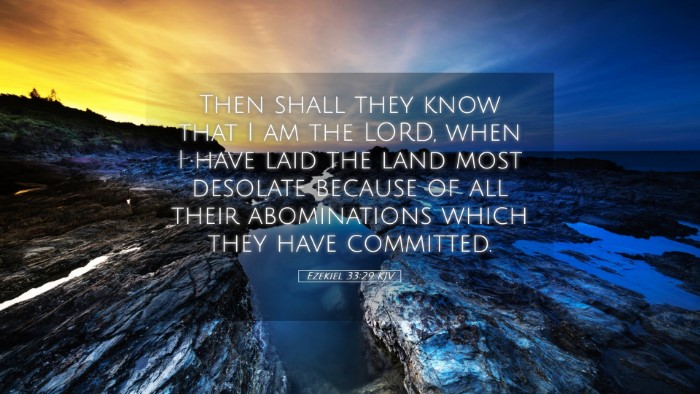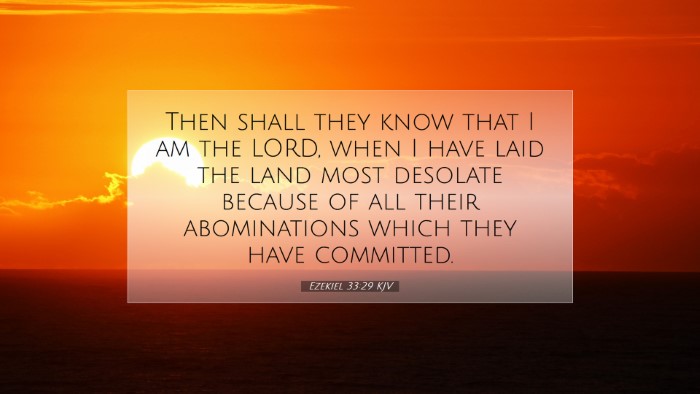Bible Commentary on Ezekiel 33:29
Ezekiel 33:29 states: "Then shall they know that I am the Lord, when I have laid the land most desolate because of all their abominations which they have committed."
Introduction
This profound verse reflects the culmination of God’s judgment upon Israel for their persistent disobedience and idolatry. In the context of Ezekiel's prophetic ministry, this verse serves as a formidable reminder of God's sovereignty and the inevitable realization of His glory through judgment.
Contextual Background
The Book of Ezekiel, penned during the Babylonian exile, addresses a nation grappling with loss and identity. Ezekiel, a prophet among the exiles, conveys God's messages that often bear a dual focus on judgment and restoration. The backdrop of this verse is significant as it emphasizes the reasons behind desolation—the abominations committed by the people.
Thematic Analysis
This verse encapsulates several critical themes relevant for theological reflection:
- The Nature of God: God's actions reveal His character. The desolation is not arbitrary but a consequence of His holiness in response to sin.
- Human Responsibility: The emphasis on the people's abominations indicates that judgment is predicated upon their conscious choices.
- Recognition of Divine Sovereignty: The phrase "Then shall they know that I am the Lord" highlights that understanding God comes through the realization of His acts.
Exegesis and Commentary
**Matthew Henry** comments on the gravity of the people's sins that led to this dire consequence. He emphasizes that divine judgment is often a means to awaken the conscience of the people. The acknowledgment of God through calamity underscores the reality that spiritual awareness is often catalyzed by suffering.
**Albert Barnes** suggests that this acknowledgment is vital for the restoration of the relationship between God and His people. He contends that through their suffering, the Israelites will come to understand the futility of their prior pursuits and the necessity of turning back to the Lord. Barnes insists that such knowledge is derived through experience rather than mere intellectual assent.
**Adam Clarke** draws attention to the Jewish mindset regarding the land promised to them and its relationship with their covenant with God. He posits that desolation serves both as a punishment and a clarion call to recognize God's holiness and authority. Clarke elucidates how this realization is critical for effective repentance and subsequent restoration.
Theological Implications
The verse urges pastors and theologians to reflect on the correlation between divine judgment and the holiness of God. It raises important questions regarding how contemporary believers understand the implications of sin in light of God's nature.
The realization of God’s majesty through judgment could inspire a deeper reverence within worship communities. It serves as a reminder that understanding who God is—including His judgment—brings about a more profound capacity for repentance and awe.
Application for the Modern Believer
For today’s believers, Ezekiel 33:29 serves as both a warning and a comfort. The call to recognize the consequences of sin is applicable across ages. It prompts believers to evaluate their lives intimately and acknowledge areas of spiritual decay.
- Repentance: Just as the Israelites needed to confront their abominations, so must Christians address the sins in their lives.
- Awareness of God’s Sovereignty: Acknowledge that God’s ways are higher than ours, and trust in His ultimate plan.
- Community Reflection: Engage church communities in discussions about sin, judgment, and grace to foster a collective understanding of God’s character.
Conclusion
In conclusion, Ezekiel 33:29 serves as a vital reminder of God's unwavering justice and the opportunity for restoration. As communities of faith look back at historical judgments, they must also lean forward in faith, understanding that the knowledge of the Lord ultimately brings hope and a path to redemption for all who turn to Him in repentance.


